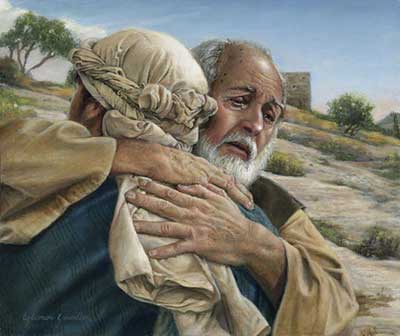
The Lord's Prayer by Deborah Beach Giordano
Jesus said, "Pray then in this way:
Our Father in heaven, hallowed be your name. Your kingdom come. Your will be done, on earth as it is in heaven. Give us this day our daily bread. And forgive us our debts, as we also have forgiven our debtors. And lead us not into temptation, but deliver us from evil."
~ The Gospel according to Matthew 6:9-13
Irresistible
Whenever I hear these words spoken by someone else, it is hard to resist joining in and saying them, too. After all, it is the prayer of the Christian faith. I know the words really well.
Versions of what we call "the Lord's prayer" appear in the gospels of Luke (11:2-4) and Matthew. The writer of Matthew frames it within a larger teaching which includes what not to do. Don't let people know when you give alms; don't make a big deal out of your fasting and prayer; don't fill your prayers with a lot of words you don't mean. Luke's version is shorter, and presents Jesus' words as a response to the disciples' request, "Lord, teach us to pray."
While we may not know exactly what Jesus said, we do know that he prayed. A lot. The gospels tell us, over and again, that the Lord prayed: we know there were times when he "went away by himself to pray," he prayed in private with his disciples, amid the worshippers in the temple, and as a part of his public ministry. Prayer was an essential part of who Jesus was, how he lived and what he did.
If we are to follow the Lord, then prayer must be central to our lives, and to our work in the world, too.
And who wouldn't want to pray as Jesus did? His prayers resulted in the casting out of demons, the healing of the sick, the feeding the hungry; in causing the lame to walk and the blind to see, raising the dead...
Holy Toledo, where do I sign up?

That desire: to pray as Jesus did — to pray as effectively as Jesus did — is why "The Lord's Prayer" has been a part of the Christian tradition from the very beginning. It is something we take very seriously: we teach it our children in Sunday School, and we adults recite it during every worship event and church function. Most of us say it at least once a day in our private devotions.
I think it's safe to say that we all know the prayer pretty well.
At least we know the words.
But I wonder...
Do we say this prayer so often that we've forgotten what the words mean? Has it become such a regular part of our life that it almost passes by unnoticed? Do we really pray as Jesus did — with the same degree of earnestness and sincere belief?
A Closer Look
I want to take a closer look at the words of this, our Number One prayer. And there is no better place to begin than at the beginning:
Jesus said, "Pray then in this way: Our Father in heaven, hallowed be your name."
The Lord begins his prayer with God, which is a good way to start. And I'm not trying to be funny by saying that.
It is important to remember that we are praying to Someone. These are not just random shouts at a unhearing, unthinking, unfeeling universe. Our prayers are heard, and they are heard by God: "the One who hears" (Genesis 21:17; 1 Sam 23:10; Psalms 6, 28, 66, 116, etc.).
Our Father, in heaven.

The word is "heaven" — not "cosmos," not "universe." It is associated with the sky, where the clouds are: the realm of the One who sits upon "the circle of the earth" (Isaiah 40:22). While God is as close to us as our breath, the Beloved is also "over all": the Ruler of heaven and earth: the One Who brought all things into being. With God, all things are possible.
An Old-Fashioned Word With a Lot of Meaning
Our Father in heaven, hallowed be your Name.
"Hallowed" is an odd old word. It has been around since at least 1611, when it appeared in the English translation of the bible authorized by King James the First.
If we know the word at all, it is as country-folk speak for a dark and shadowy glade or vale: "down in the hallows" (pronounced: hallers).
In our case it holds a different meaning. And, although I've often fussed about the Church's use of obscure and obsolete language, in the case of "hallowed" I'm willing to make an exception. That's because the Greek word, agiastheto, is difficult to translate precisely. It does mean "holy," as most modern bibles render it. But it also means "to reverence"; it indicates that we come before the Beloved in holy awe and admiration. It describes both the holiness and our response to it.
Wonderful, glorious, holy and awe-inspiring is your Name,
O Eternal One, our God.
God's Name
Now, the business about the "name" of God being holy is important. Jesus was a great one for giving people nicknames that described something about their character. He called Peter, "Rocky" — for reasons we will explore at a future date; and referred to James and John as "sons of thunder," perhaps because of their explosive temperaments (Mark 3:16-17).
 The closest equivalent for us is when we say of someone: "He's really 'Mr. Personality.'" or "Her middle name should be 'chocolate.'" It describes the essence the person.
The closest equivalent for us is when we say of someone: "He's really 'Mr. Personality.'" or "Her middle name should be 'chocolate.'" It describes the essence the person.
Jesus tells us that God's name is Holy. It is the essence of God: it is who God is, it is what God does, it is God's desire and nature. If God is present, holiness is there. It is radiance, and awe, and wonder, power and glory — it is magnificent, and overwhelming and... it is something more.
In the same breath that he described God as holy: supremely divine and awe-ful — Jesus called the Beloved our father. God is our heavenly parent; the source of our life, the One who brought us safely here.
We can pray with absolute honesty and fearlessness — at any time, for any reason. For God is like a father who runs to meet his children as soon as we come into view, though we may be covered with pig slop and dressed in rags.

One who recognizes us beneath the dirt, grime, and despair — and embraces us with joy and love. God is One who throws a party just because we show up (Luke 15:11).
Perhaps that word: "father" — as understood by Jesus — is the definition of hallowed-ness: simple, unwavering, unconditional love. God is One we can rely on to understand us, to love us, to hear our prayers with compassion and concern. God is on our side.
Take a moment to imagine what that truly means; and how it feels to be loved so completely. That is holiness made real.
Jesus said, "Pray then in this way: 'Our Father,'"
Jesus said, "Pray then in this way: Our Father,"
 "Our father." Every time we say the Lord's Prayer we affirm that we are all children of the one God; sisters and brothers of one another and of our Lord Christ. That's quite a concept.
"Our father." Every time we say the Lord's Prayer we affirm that we are all children of the one God; sisters and brothers of one another and of our Lord Christ. That's quite a concept.
I wonder what it would be like if we took these teachings to heart.
If we were as confident of God's love for us — and for all people — as Jesus was, then perhaps we could pray as Jesus did.
And if we really prayed as the Lord did, perhaps we would start to live as he lived. We would love God and love one another as Jesus taught us to do. We would feed the hungry, care for the sick, visit the lonely and imprisoned, and restore hope to the hopeless. We would be kind and forgiving to ourselves.
Perhaps, if we truly pray as Jesus did, we will begin to grow into the likeness of our Lord. Maybe we can become a people whose middle name is "holy" — which is just another word for love.
Suggested Spiritual Exercise
Pray the Lord's Prayer each day with mindfulness; really pay attention to each word and phrase. Do you hear something you've never heard before, or that you hear "differently" from in the past?